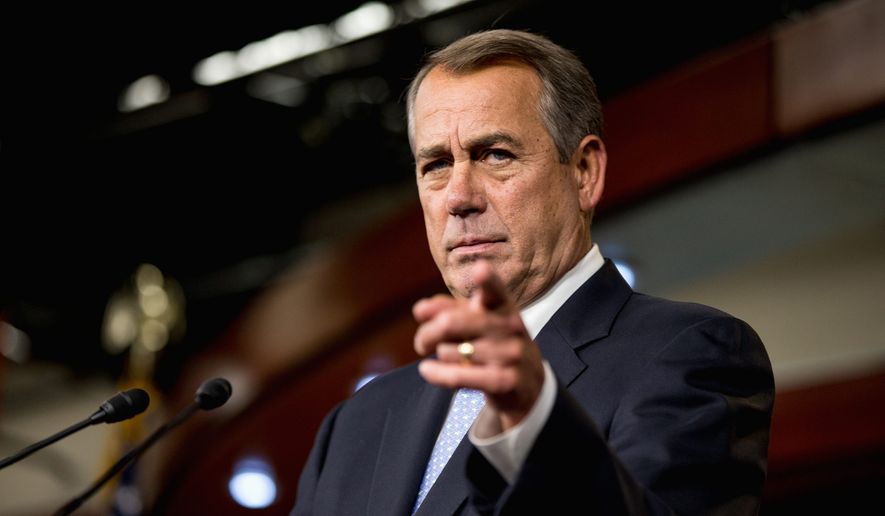The House voted Wednesday to ban most abortions after 20 weeks of pregnancy as Republicans delivered a key piece of the pro-life agenda and overcame an embarrassing false start earlier this year.
Dubbed the “Pain-Capable Unborn Child Protection Act,” the legislation cleared on a 242-184 vote that largely broke along party lines, with just four pro-life Democrats joining in support and four Republicans voting against it.
Forty-two states already prohibit abortion after a certain point in the pregnancy, with 10 using the 20-week threshold — the point where some controversial research says fetuses can feel pain. Wednesday’s bill would extend the ban nationwide.
“We have no higher obligation than to speak out for those who cannot speak for themselves,” Speaker John A. Boehner, Ohio Republican, said.
The bill would still need to survive the Senate, where Democrats are likely to mount a filibuster, and to get by President Obama, who has vowed a veto, saying the bill restricts women’s choices at a difficult time for them.
“The bill continues to add harsh burdens to the survivors of sexual assault, rape and incest, who are already enduring unimaginable hardship It’s disgraceful,” White House press secretary Josh Earnest said.
SEE ALSO: Obesity weighing down U.S. economy, study finds
While pro-life groups hailed the bill’s passage as a pivotal moment, pro-choice groups said the bill is unconstitutional and unnecessary. Abortions after 20 weeks are rare and usually involve some type of medical complication, they said, so the decision should be left to women and their doctors.
Republicans, though, said Congress had a fundamental duty to act.
“You don’t have life, you don’t have anything else,” said Rep. Virginia Foxx, North Carolina Republican.
Women who become pregnant because of rape are exempt from the 20-week cutoff, so long as they’ve received counseling or medical treatment at least 48 hours before the procedure.
The bill’s authors dropped a provision that would have required women to report the rape to the police. The stipulation had forced GOP leaders to withdraw the bill in January, after Republican women lawmakers argued victims had been through enough without having to prove a legal case.
The GOP had intended to pass the bill to coincide with the tens of thousands of marchers who walk Constitution Avenue to the Supreme Court every year in January to protest the 1973 ruling in Roe v. Wade establishing a legal right to abortion.
SEE ALSO: Immigration enforcement system dysfunction tears apart family
Rep. Trent Franks, the Arizona Republican who wrote the 20-week ban, praised GOP leaders for sticking with the bill and bringing it back with the tweaks.
“I commend them from the core of my soul for honoring their commitment,” Mr. Franks said outside the chamber.
He said Rep. Diane Black, Tennessee Republican, brokered a compromise that replaced mandatory rape reporting with counseling, which won the support of GOP women such as Rep. Renee Ellmers, a North Carolina Republican who objected in January.
“As difficult as this process has been, we have arrived at a better bill,” Ms. Ellmers said after the vote. “Today’s bill alleviates my initial concern as it demonstrates compassion towards women who are in the midst of a crisis while also creating additional protections for the unborn.”
Wednesday’s vote occurred days after new research found that some babies born prematurely, as soon as 22 weeks, can survive, further complicating the complex issue.
But Republicans said the study’s release was coincidental. Rather, they had timed Wednesday’s vote to coincide with the second anniversary of Dr. Kermit Gosnell’s conviction for killing three babies that were born alive at his Philadelphia abortion practice.
Mr. Franks’ bill would insist that a second neonatal physician be present at abortions performed after 20 weeks under one of the bill’s exemptions, so that a baby born alive during an abortion can be cared for and rushed to the hospital.
In cases of incest, the bill would exempt minors who report the incident to a government agency or law enforcement.
House Democrats condemned the bill, saying those same protections for victims of incest should apply to all women.
“They put an age limit on it,” said Rep. Louise Slaughter, New York Democrat. “Can you imagine that?”
• Ben Wolfgang contributed to this report.
• Tom Howell Jr. can be reached at thowell@washingtontimes.com.




Please read our comment policy before commenting.